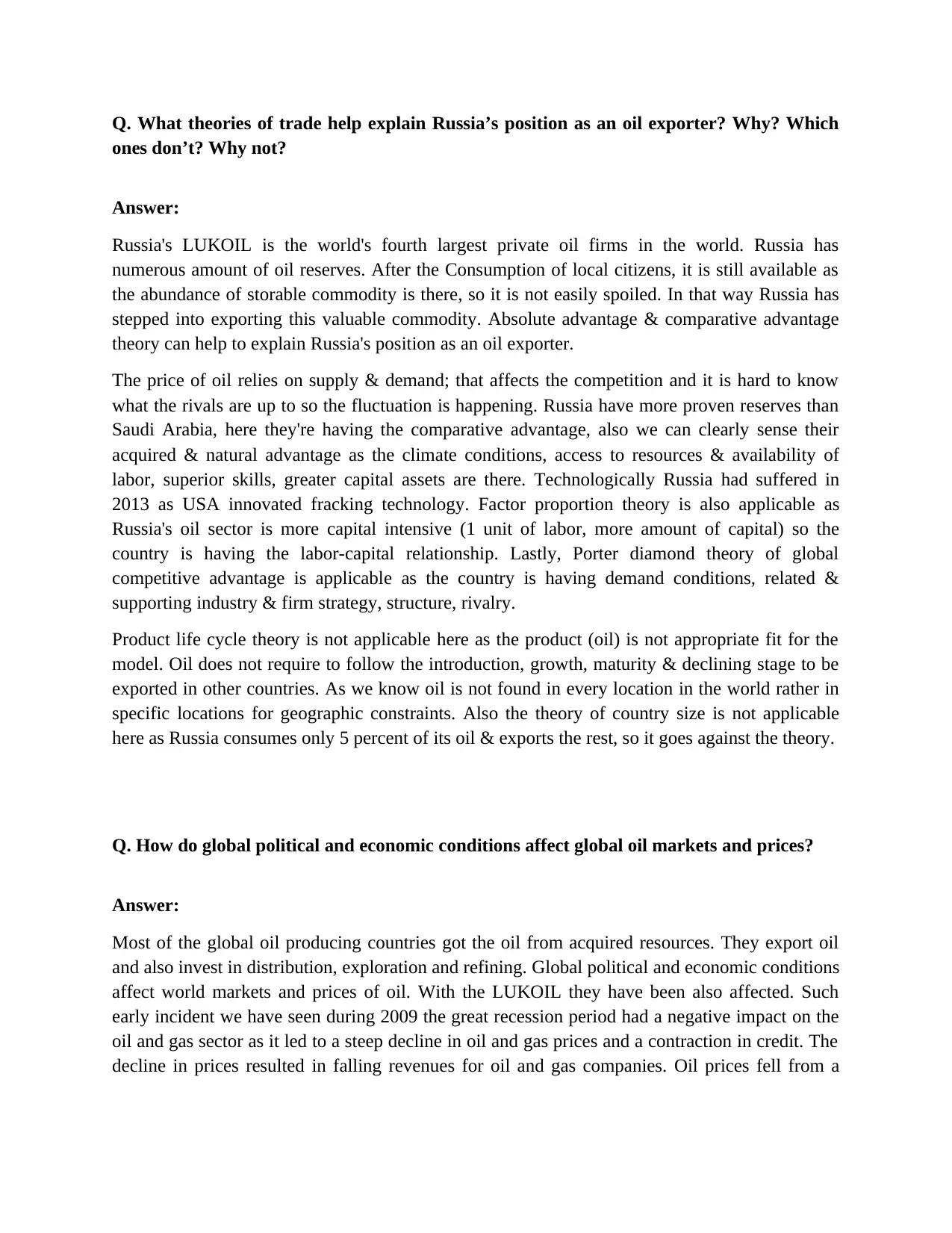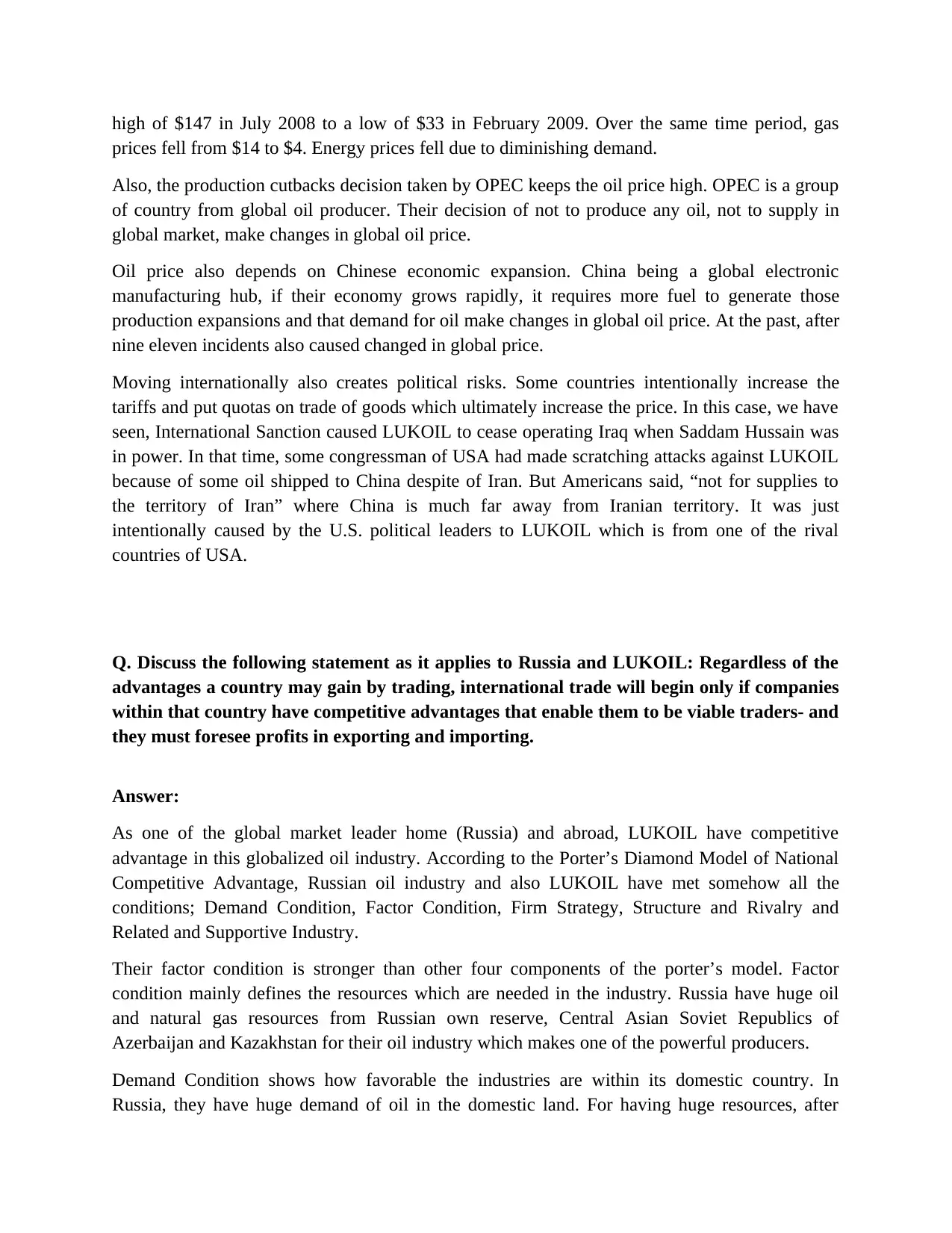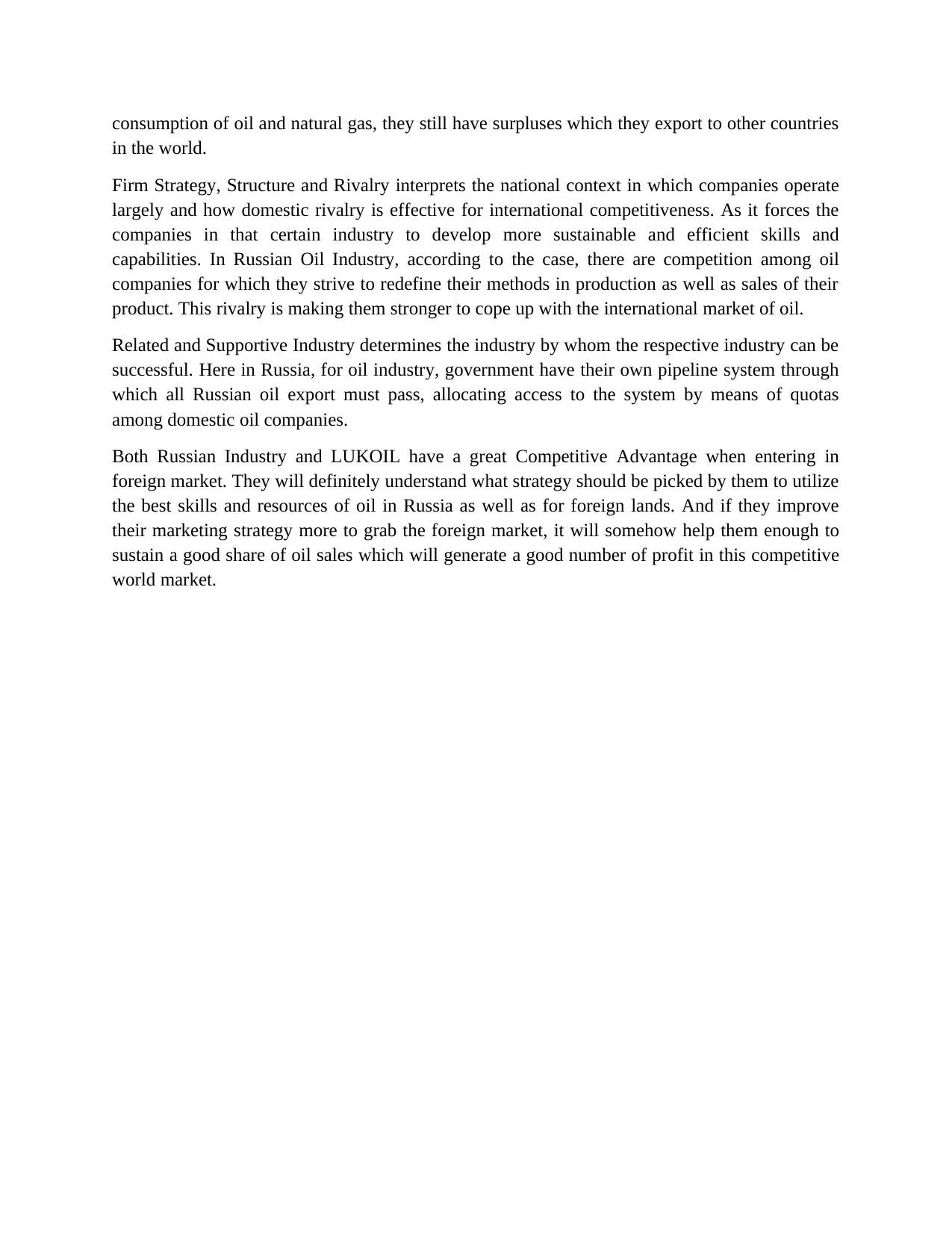Economics Report: Russia's Oil Export and LUKOIL in Global Markets
VerifiedAdded on 2023/02/03
|3
|1237
|55
Report
AI Summary
This report provides a comprehensive analysis of Russia's position as an oil exporter, examining relevant economic theories such as absolute and comparative advantage, the factor proportion theory, and Porter's Diamond Model. It explains how these theories help or do not help in understanding Russia's role. The report further explores the impact of global political and economic conditions on the global oil market and prices, including the influence of OPEC decisions, Chinese economic expansion, and international sanctions. Finally, the report discusses the competitive advantages of Russian oil companies, particularly LUKOIL, in the context of international trade, emphasizing the importance of competitive advantages for companies to be viable traders and their need to foresee profits in exporting and importing. The report highlights factors such as Russia's vast oil reserves, its strategic location, and its ability to navigate global market dynamics, making it a key player in the global oil industry.

Q. What theories of trade help explain Russia’s position as an oil exporter? Why? Which
ones don’t? Why not?
Answer:
Russia's LUKOIL is the world's fourth largest private oil firms in the world. Russia has
numerous amount of oil reserves. After the Consumption of local citizens, it is still available as
the abundance of storable commodity is there, so it is not easily spoiled. In that way Russia has
stepped into exporting this valuable commodity. Absolute advantage & comparative advantage
theory can help to explain Russia's position as an oil exporter.
The price of oil relies on supply & demand; that affects the competition and it is hard to know
what the rivals are up to so the fluctuation is happening. Russia have more proven reserves than
Saudi Arabia, here they're having the comparative advantage, also we can clearly sense their
acquired & natural advantage as the climate conditions, access to resources & availability of
labor, superior skills, greater capital assets are there. Technologically Russia had suffered in
2013 as USA innovated fracking technology. Factor proportion theory is also applicable as
Russia's oil sector is more capital intensive (1 unit of labor, more amount of capital) so the
country is having the labor-capital relationship. Lastly, Porter diamond theory of global
competitive advantage is applicable as the country is having demand conditions, related &
supporting industry & firm strategy, structure, rivalry.
Product life cycle theory is not applicable here as the product (oil) is not appropriate fit for the
model. Oil does not require to follow the introduction, growth, maturity & declining stage to be
exported in other countries. As we know oil is not found in every location in the world rather in
specific locations for geographic constraints. Also the theory of country size is not applicable
here as Russia consumes only 5 percent of its oil & exports the rest, so it goes against the theory.
Q. How do global political and economic conditions affect global oil markets and prices?
Answer:
Most of the global oil producing countries got the oil from acquired resources. They export oil
and also invest in distribution, exploration and refining. Global political and economic conditions
affect world markets and prices of oil. With the LUKOIL they have been also affected. Such
early incident we have seen during 2009 the great recession period had a negative impact on the
oil and gas sector as it led to a steep decline in oil and gas prices and a contraction in credit. The
decline in prices resulted in falling revenues for oil and gas companies. Oil prices fell from a
ones don’t? Why not?
Answer:
Russia's LUKOIL is the world's fourth largest private oil firms in the world. Russia has
numerous amount of oil reserves. After the Consumption of local citizens, it is still available as
the abundance of storable commodity is there, so it is not easily spoiled. In that way Russia has
stepped into exporting this valuable commodity. Absolute advantage & comparative advantage
theory can help to explain Russia's position as an oil exporter.
The price of oil relies on supply & demand; that affects the competition and it is hard to know
what the rivals are up to so the fluctuation is happening. Russia have more proven reserves than
Saudi Arabia, here they're having the comparative advantage, also we can clearly sense their
acquired & natural advantage as the climate conditions, access to resources & availability of
labor, superior skills, greater capital assets are there. Technologically Russia had suffered in
2013 as USA innovated fracking technology. Factor proportion theory is also applicable as
Russia's oil sector is more capital intensive (1 unit of labor, more amount of capital) so the
country is having the labor-capital relationship. Lastly, Porter diamond theory of global
competitive advantage is applicable as the country is having demand conditions, related &
supporting industry & firm strategy, structure, rivalry.
Product life cycle theory is not applicable here as the product (oil) is not appropriate fit for the
model. Oil does not require to follow the introduction, growth, maturity & declining stage to be
exported in other countries. As we know oil is not found in every location in the world rather in
specific locations for geographic constraints. Also the theory of country size is not applicable
here as Russia consumes only 5 percent of its oil & exports the rest, so it goes against the theory.
Q. How do global political and economic conditions affect global oil markets and prices?
Answer:
Most of the global oil producing countries got the oil from acquired resources. They export oil
and also invest in distribution, exploration and refining. Global political and economic conditions
affect world markets and prices of oil. With the LUKOIL they have been also affected. Such
early incident we have seen during 2009 the great recession period had a negative impact on the
oil and gas sector as it led to a steep decline in oil and gas prices and a contraction in credit. The
decline in prices resulted in falling revenues for oil and gas companies. Oil prices fell from a
Paraphrase This Document
Need a fresh take? Get an instant paraphrase of this document with our AI Paraphraser

high of $147 in July 2008 to a low of $33 in February 2009. Over the same time period, gas
prices fell from $14 to $4. Energy prices fell due to diminishing demand.
Also, the production cutbacks decision taken by OPEC keeps the oil price high. OPEC is a group
of country from global oil producer. Their decision of not to produce any oil, not to supply in
global market, make changes in global oil price.
Oil price also depends on Chinese economic expansion. China being a global electronic
manufacturing hub, if their economy grows rapidly, it requires more fuel to generate those
production expansions and that demand for oil make changes in global oil price. At the past, after
nine eleven incidents also caused changed in global price.
Moving internationally also creates political risks. Some countries intentionally increase the
tariffs and put quotas on trade of goods which ultimately increase the price. In this case, we have
seen, International Sanction caused LUKOIL to cease operating Iraq when Saddam Hussain was
in power. In that time, some congressman of USA had made scratching attacks against LUKOIL
because of some oil shipped to China despite of Iran. But Americans said, “not for supplies to
the territory of Iran” where China is much far away from Iranian territory. It was just
intentionally caused by the U.S. political leaders to LUKOIL which is from one of the rival
countries of USA.
Q. Discuss the following statement as it applies to Russia and LUKOIL: Regardless of the
advantages a country may gain by trading, international trade will begin only if companies
within that country have competitive advantages that enable them to be viable traders- and
they must foresee profits in exporting and importing.
Answer:
As one of the global market leader home (Russia) and abroad, LUKOIL have competitive
advantage in this globalized oil industry. According to the Porter’s Diamond Model of National
Competitive Advantage, Russian oil industry and also LUKOIL have met somehow all the
conditions; Demand Condition, Factor Condition, Firm Strategy, Structure and Rivalry and
Related and Supportive Industry.
Their factor condition is stronger than other four components of the porter’s model. Factor
condition mainly defines the resources which are needed in the industry. Russia have huge oil
and natural gas resources from Russian own reserve, Central Asian Soviet Republics of
Azerbaijan and Kazakhstan for their oil industry which makes one of the powerful producers.
Demand Condition shows how favorable the industries are within its domestic country. In
Russia, they have huge demand of oil in the domestic land. For having huge resources, after
prices fell from $14 to $4. Energy prices fell due to diminishing demand.
Also, the production cutbacks decision taken by OPEC keeps the oil price high. OPEC is a group
of country from global oil producer. Their decision of not to produce any oil, not to supply in
global market, make changes in global oil price.
Oil price also depends on Chinese economic expansion. China being a global electronic
manufacturing hub, if their economy grows rapidly, it requires more fuel to generate those
production expansions and that demand for oil make changes in global oil price. At the past, after
nine eleven incidents also caused changed in global price.
Moving internationally also creates political risks. Some countries intentionally increase the
tariffs and put quotas on trade of goods which ultimately increase the price. In this case, we have
seen, International Sanction caused LUKOIL to cease operating Iraq when Saddam Hussain was
in power. In that time, some congressman of USA had made scratching attacks against LUKOIL
because of some oil shipped to China despite of Iran. But Americans said, “not for supplies to
the territory of Iran” where China is much far away from Iranian territory. It was just
intentionally caused by the U.S. political leaders to LUKOIL which is from one of the rival
countries of USA.
Q. Discuss the following statement as it applies to Russia and LUKOIL: Regardless of the
advantages a country may gain by trading, international trade will begin only if companies
within that country have competitive advantages that enable them to be viable traders- and
they must foresee profits in exporting and importing.
Answer:
As one of the global market leader home (Russia) and abroad, LUKOIL have competitive
advantage in this globalized oil industry. According to the Porter’s Diamond Model of National
Competitive Advantage, Russian oil industry and also LUKOIL have met somehow all the
conditions; Demand Condition, Factor Condition, Firm Strategy, Structure and Rivalry and
Related and Supportive Industry.
Their factor condition is stronger than other four components of the porter’s model. Factor
condition mainly defines the resources which are needed in the industry. Russia have huge oil
and natural gas resources from Russian own reserve, Central Asian Soviet Republics of
Azerbaijan and Kazakhstan for their oil industry which makes one of the powerful producers.
Demand Condition shows how favorable the industries are within its domestic country. In
Russia, they have huge demand of oil in the domestic land. For having huge resources, after

consumption of oil and natural gas, they still have surpluses which they export to other countries
in the world.
Firm Strategy, Structure and Rivalry interprets the national context in which companies operate
largely and how domestic rivalry is effective for international competitiveness. As it forces the
companies in that certain industry to develop more sustainable and efficient skills and
capabilities. In Russian Oil Industry, according to the case, there are competition among oil
companies for which they strive to redefine their methods in production as well as sales of their
product. This rivalry is making them stronger to cope up with the international market of oil.
Related and Supportive Industry determines the industry by whom the respective industry can be
successful. Here in Russia, for oil industry, government have their own pipeline system through
which all Russian oil export must pass, allocating access to the system by means of quotas
among domestic oil companies.
Both Russian Industry and LUKOIL have a great Competitive Advantage when entering in
foreign market. They will definitely understand what strategy should be picked by them to utilize
the best skills and resources of oil in Russia as well as for foreign lands. And if they improve
their marketing strategy more to grab the foreign market, it will somehow help them enough to
sustain a good share of oil sales which will generate a good number of profit in this competitive
world market.
in the world.
Firm Strategy, Structure and Rivalry interprets the national context in which companies operate
largely and how domestic rivalry is effective for international competitiveness. As it forces the
companies in that certain industry to develop more sustainable and efficient skills and
capabilities. In Russian Oil Industry, according to the case, there are competition among oil
companies for which they strive to redefine their methods in production as well as sales of their
product. This rivalry is making them stronger to cope up with the international market of oil.
Related and Supportive Industry determines the industry by whom the respective industry can be
successful. Here in Russia, for oil industry, government have their own pipeline system through
which all Russian oil export must pass, allocating access to the system by means of quotas
among domestic oil companies.
Both Russian Industry and LUKOIL have a great Competitive Advantage when entering in
foreign market. They will definitely understand what strategy should be picked by them to utilize
the best skills and resources of oil in Russia as well as for foreign lands. And if they improve
their marketing strategy more to grab the foreign market, it will somehow help them enough to
sustain a good share of oil sales which will generate a good number of profit in this competitive
world market.
⊘ This is a preview!⊘
Do you want full access?
Subscribe today to unlock all pages.

Trusted by 1+ million students worldwide
1 out of 3
Related Documents
Your All-in-One AI-Powered Toolkit for Academic Success.
+13062052269
info@desklib.com
Available 24*7 on WhatsApp / Email
![[object Object]](/_next/static/media/star-bottom.7253800d.svg)
Unlock your academic potential
Copyright © 2020–2026 A2Z Services. All Rights Reserved. Developed and managed by ZUCOL.





